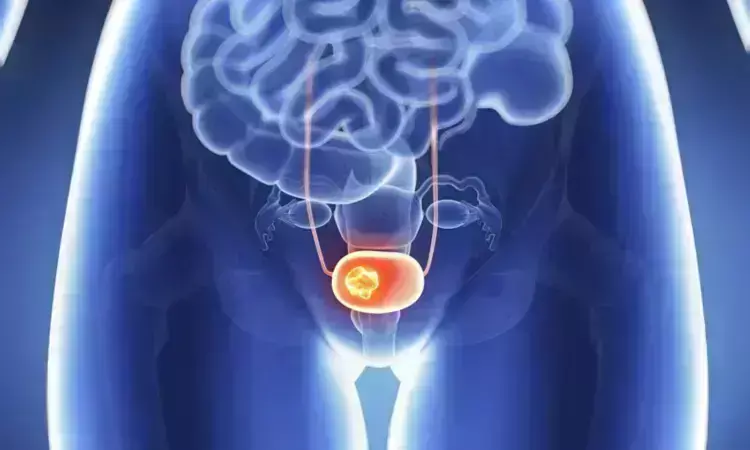- Home
- Medical news & Guidelines
- Anesthesiology
- Cardiology and CTVS
- Critical Care
- Dentistry
- Dermatology
- Diabetes and Endocrinology
- ENT
- Gastroenterology
- Medicine
- Nephrology
- Neurology
- Obstretics-Gynaecology
- Oncology
- Ophthalmology
- Orthopaedics
- Pediatrics-Neonatology
- Psychiatry
- Pulmonology
- Radiology
- Surgery
- Urology
- Laboratory Medicine
- Diet
- Nursing
- Paramedical
- Physiotherapy
- Health news
- Fact Check
- Bone Health Fact Check
- Brain Health Fact Check
- Cancer Related Fact Check
- Child Care Fact Check
- Dental and oral health fact check
- Diabetes and metabolic health fact check
- Diet and Nutrition Fact Check
- Eye and ENT Care Fact Check
- Fitness fact check
- Gut health fact check
- Heart health fact check
- Kidney health fact check
- Medical education fact check
- Men's health fact check
- Respiratory fact check
- Skin and hair care fact check
- Vaccine and Immunization fact check
- Women's health fact check
- AYUSH
- State News
- Andaman and Nicobar Islands
- Andhra Pradesh
- Arunachal Pradesh
- Assam
- Bihar
- Chandigarh
- Chattisgarh
- Dadra and Nagar Haveli
- Daman and Diu
- Delhi
- Goa
- Gujarat
- Haryana
- Himachal Pradesh
- Jammu & Kashmir
- Jharkhand
- Karnataka
- Kerala
- Ladakh
- Lakshadweep
- Madhya Pradesh
- Maharashtra
- Manipur
- Meghalaya
- Mizoram
- Nagaland
- Odisha
- Puducherry
- Punjab
- Rajasthan
- Sikkim
- Tamil Nadu
- Telangana
- Tripura
- Uttar Pradesh
- Uttrakhand
- West Bengal
- Medical Education
- Industry
Metabolic Syndrome linked to bladder Cancer Risk: Study

Researchers have found in a new study that Metabolic Syndrome is linked to bladder Cancer Risk. It revealed that components of MetS-such as diabetes, low HDL, and high triglycerides-are significantly associated with higher bladder cancer risk.
This study employed bibliometric analysis to explore global research on metabolic syndrome (MetS) and bladder cancer (BC), focusing on characteristics and research trends. Additionally, a meta-analysis was conducted to comprehensively evaluate the association between MetS and its components and bladder cancer risk.
They conducted a comprehensive search of publications from 2002 to 2022 in the Web of Science Core Collection (WoSCC). Visualization analysis was performed using the Open Scientometrics Data Analysis and Visualization Platform, VOSviewer software and the R package “bibliometrix”. For the meta-analysis, data from PubMed, Embase and the Cochrane Library up to March 22, 2022, were utilized. Literature from PubMed, Embase, Cochrane and Web of Science up to March 25, 2022, were retrieved, and data extraction was independently performed by two authors. A random-effects model was used to calculate pooled odds ratios (ORs) and 95% confidence intervals (95% CIs). Meta-analysis was conducted using RevMan 5.4 software.
Result: In the bibliometric analysis, 147 papers were included, and information on countries, institutions, authors, journals and keywords from Web of Science was analyzed and visualized. For the meta-analysis, 11 studies involving 665,164 patients were included. The pooled analysis of six case-control studies showed that patients with MetS had a higher risk of bladder cancer compared to the non-MetS control group (OR = 1.62, 95% CI: 1.08–2.43, P < 0.01). Analysis of MetS components revealed that diabetes (OR = 0.44, 95% CI: 0.32–0.61, P < 0.01), low high-density lipoprotein (HDL) (OR = 0.29, 95% CI: 0.19–0.44, P < 0.01) and high triglycerides (OR = 0.59, 95% CI: 0.39–0.88, P < 0.01) were associated with an increased risk of bladder cancer. In contrast, hypertension (OR = 0.84, 95% CI: 0.62–1.12, P > 0.05) and obesity (OR = 0.8, 95% CI: 0.44–1.45, P > 0.05) showed no significant association with bladder cancer risk.
This study provided valuable insights into the association between MetS and bladder cancer risk by identifying past research trends and hotspots. MetS and its components, such as diabetes, low HDL and high triglycerides, were associated with an increased risk of bladder cancer.
Reference:
Yuan, Y., Liu, T., Yao, Y. et al. Metabolic syndrome and bladder cancer risk: a comprehensive evidence synthesis combining bibliometric and meta-analysis approaches. BMC Urol 25, 132 (2025). https://doi.org/10.1186/s12894-025-01812-9
Dr. Shravani Dali has completed her BDS from Pravara institute of medical sciences, loni. Following which she extensively worked in the healthcare sector for 2+ years. She has been actively involved in writing blogs in field of health and wellness. Currently she is pursuing her Masters of public health-health administration from Tata institute of social sciences. She can be contacted at editorial@medicaldialogues.in.
Dr Kamal Kant Kohli-MBBS, DTCD- a chest specialist with more than 30 years of practice and a flair for writing clinical articles, Dr Kamal Kant Kohli joined Medical Dialogues as a Chief Editor of Medical News. Besides writing articles, as an editor, he proofreads and verifies all the medical content published on Medical Dialogues including those coming from journals, studies,medical conferences,guidelines etc. Email: drkohli@medicaldialogues.in. Contact no. 011-43720751


